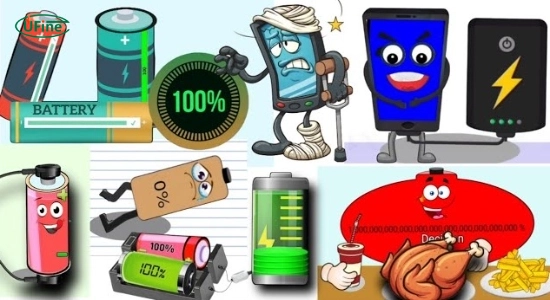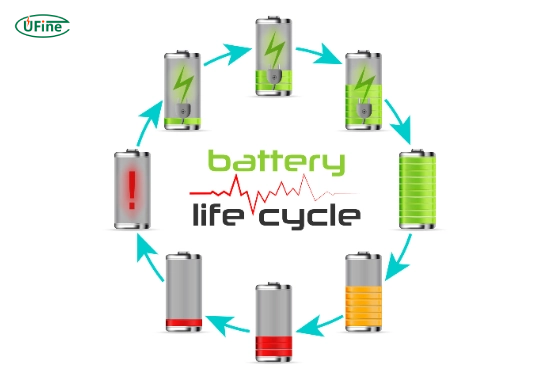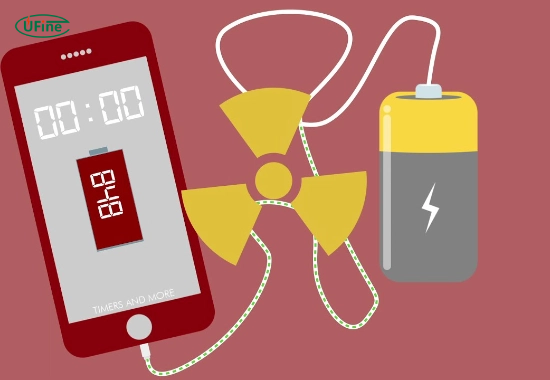
- Part 1. What is battery overcharging?
- Part 2. How does overcharging affect battery lifespan?
- Part 3. What happens to the charging cycles during overcharging?
- Part 4. How does overcharging affect different types of batteries?
- Part 5. Why is heat generation a significant issue during overcharging?
- Part 6. How can overcharging be prevented?
- Part 7. What are the signs of an overcharged battery?
- Part 8. Can overcharging be reversed?
- Part 9. How does overcharging affect safety?
- Part 10. How does overcharging impact the environment?
- Part 11. FAQs
Batteries are essential in our daily lives, powering everything from smartphones to electric vehicles. However, proper maintenance and charging practices are crucial to ensure their longevity. One common issue that negatively impacts batteries is overcharging. Overcharging occurs when a battery is charged beyond its maximum capacity, leading to harmful chemical and physical changes. But how exactly does overcharging affect charging cycles and battery lifespan? In this detailed guide, we’ll explore the science behind overcharging, its effects on batteries, and how to prevent it. Let’s dive in!
Part 1. What is battery overcharging?
Battery overcharging occurs when a charging device continues to supply power to a battery that has reached full charge. This condition typically occurs when there is no mechanism to stop the charging process, such as a faulty charger or improper voltage regulation.
Excess energy is converted into heat when overcharging, causing the battery to overheat. Over time, this can lead to chemical degradation, swelling, and even permanent damage to the battery’s components.
Part 2. How does overcharging affect battery lifespan?
Overcharging a battery significantly reduces its lifespan. Batteries are designed with limited charging cycles, determining how often they can be charged and discharged before their performance deteriorates.
When a charging device overcharges a battery, the following issues can arise:
- Increased internal heat: Excessive heat generated during overcharging accelerates wear and tear on the battery’s internal components.
- Electrolyte degradation: Overcharging can cause the electrolyte (the medium facilitating ion movement) to evaporate or break down, reducing the battery’s capacity.
- Electrode wear: Repeated overcharging can damage the electrodes, leading to a loss in energy storage efficiency.
These factors shorten the battery’s lifespan, meaning fewer charging cycles before the battery becomes unusable.
Part 3. What happens to the charging cycles during overcharging?
The term charging cycle refers to charging a battery to full capacity and discharging it completely. Batteries have a finite number of these cycles before their performance drops significantly. When overcharging occurs, the battery prematurely loses its ability to hold a charge due to:
- Increased stress on chemical reactions: Overcharging forces chemical reactions to continue beyond their natural limits, causing irreversible damage.
- Depletion of active materials: The materials responsible for energy storage degrade faster when exposed to overcharging.
In short, overcharging reduces the number of effective charging cycles, causing the battery to degrade faster than it usually would.
Part 4. How does overcharging affect different types of batteries?
Different types of batteries react differently to overcharging. Let’s take a closer look at how common battery types are affected:
1. Lithium-ion batteries (Li-ion)
Li-ion batteries, used in smartphones, laptops, and electric vehicles, are susceptible to overcharging. Excessive voltage can cause:
- Thermal runaway: A dangerous condition where the battery overheats and catches fire.
- Capacity loss: Overcharging reduces the battery’s ability to hold a charge over time.
2. Lead-acid batteries
Lead-acid batteries, commonly used in cars and solar power systems, can suffer from:
- Electrolyte boiling: Overcharging causes the electrolyte to evaporate, leading to reduced performance.
- Plate corrosion: The plates degrade over time, shortening the battery’s lifespan.
3. Nickel-based batteries (NiMH and NiCd)
Nickel-based batteries are more robust but still face issues like:
- Increased self-discharge: Overcharging raises the rate at which these batteries lose charge when unused.
- Memory effect: These batteries may “remember” the overcharged state, resulting in a reduced capacity.
Which Type of Battery Can Be Overcharged?
Part 5. Why is heat generation a significant issue during overcharging?
One of the most significant consequences of overcharging is heat generation. Batteries are designed to operate within specific temperature ranges. When overcharged, the excess energy is converted into heat, leading to:
- Thermal expansion: The battery casing may swell or rupture due to high temperatures.
- Chemical instability: Elevated temperatures accelerate chemical reactions, potentially leading to leakage or explosions.
- Irreversible damage: Heat damages internal components, permanently reducing the battery’s efficiency.
Part 6. How can overcharging be prevented?
Preventing overcharging is essential for maintaining battery health. Here are some practical tips to avoid overcharging:
- Use smart chargers: Smart chargers automatically stop charging when the battery reaches full capacity.
- Follow manufacturer guidelines: Always use chargers and power supplies recommended by the battery manufacturer.
- Monitor charging time: Avoid leaving devices plugged in for extended periods, especially overnight.
- Install voltage regulators: For lead-acid batteries, a voltage regulator can prevent overcharging by limiting the input voltage.
Implementing these steps can significantly reduce the risk of overcharging and extend your battery’s lifespan.
Part 7. What are the signs of an overcharged battery?
If you suspect your battery has been overcharged, look for these warning signs:
- Swelling or bulging: The battery casing appears swollen due to internal pressure.
- Overheating: The battery feels excessively hot, even when not in use.
- Reduced capacity: The battery drains faster than usual.
- Leakage: Liquid or residue appears around the battery terminals.
- Unusual odors: A burnt or chemical smell may indicate overheating.
If you notice these symptoms, stop using the battery immediately and seek professional advice.
Part 8. Can overcharging be reversed?
Unfortunately, the damage caused by overcharging is often irreversible. Once internal components degrade, you cannot fully restore the battery’s performance. However, you can prevent further damage by:
- Stopping overcharging immediately: Disconnect the charger as soon as you notice overcharging.
- Using proper charging equipment: Switch to a smart charger or voltage-regulated system.
- Regular maintenance: For lead-acid batteries, check electrolyte levels and refill with distilled water if necessary.
Part 9. How does overcharging affect safety?
Overcharging poses significant safety risks, especially for lithium-ion batteries. Potential hazards include:
- Fire hazards: Overcharging can lead to thermal runaway, causing the battery to catch fire.
- Explosions: Excessive pressure buildup may result in a blast.
- Toxic fumes: Overheated batteries can release harmful gases like hydrogen and oxygen.
To minimize these risks, always handle batteries carefully and avoid overcharging at all costs.
Part 10. How does overcharging impact the environment?
Overcharging damages batteries and has environmental consequences. Damaged batteries are more likely to end up in landfills, where they can leak harmful chemicals into the soil and water. Furthermore, the increased demand for replacement batteries leads to more resource extraction and manufacturing, contributing to environmental degradation.
Practicing proper charging habits can reduce waste and help protect the environment.
Part 11. FAQs
-
What is the leading cause of battery overcharging?
Battery overcharging typically occurs due to faulty chargers, improper voltage regulation, or leaving devices plugged in for too long. -
Can overcharging cause a battery to explode?
Yes, overcharging can lead to overheating and pressure buildup, which may result in a battery explosion, especially with lithium-ion batteries. -
How can I tell if my battery is overcharged?
Signs of overcharging include swelling, overheating, reduced capacity, leakage, and unusual odors. -
Are all battery types equally affected by overcharging?
No, lithium-ion batteries are more sensitive to overcharging. In contrast, lead-acid and nickel-based batteries are slightly more robust but still vulnerable to damage. -
Can I fix an overcharged battery?
In most cases, the damage caused by overcharging is irreversible. However, you can prevent further damage by using proper charging equipment and stopping overcharging immediately.
Related Tags:
More Articles

Battery Load Test: A Comprehensive Guide
Step-by-step battery load test guide for car, solar & industrial use. Learn how to load test a battery, interpret voltage charts, and avoid common mistakes.
The Comprehensive Guide to Battery Balancing and Battery Balancer
Discover how battery balancers improve lithium battery performance, lifespan, and safety. Learn types, functions, and tips to choose the right balancer.
What Is the Best Voltage for a Chainsaw Battery?
Compare 12V-80V chainsaw batteries for light pruning, medium firewood, and professional cutting. See best battery chainsaw with runtime charts and safety tips.
Lithium VS. Alkaline Batteries: A Comprehensive Comparison
Lithium batteries last 3–7× longer than alkaline and perform better in cold weather. Compare lifespan, cost, safety, and best uses to choose the right battery.
Comparing Lithium-Sulfur and Lithium-Ion Batteries: Which is Right for You?
Compare lithium-sulfur (Li-S) and lithium-ion batteries on energy, lifespan, cost, safety, and applications. Best choice for drones, EVs, and electronics.





